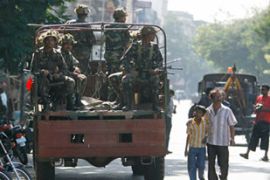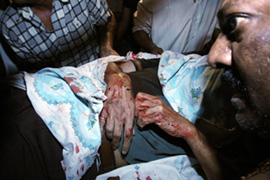Indian troops ‘take siege hotel’
Prime minister condemns attacks in India’s financial hub that have left more than 100 people dead.

Gunfire and explosions were heard throughout the day from both the five-star hotels where scores of terrified guests were trapped in their rooms.
Eight hostages were also reported to have been freed after being held hostage at the headquarters of a Jewish group.
Commandos were also attempting to free up to 30 people believed to be held hostage in the Oberoi Trident hotel.
The fighting continued a day after about 100 armed men launched an attack, firing indiscriminately and throwing grenades after landing in Mumbai aboard inflatable boats.
Six attackers have been killed and nine others arrested since the violence began on Wednesday night, police said.
‘Senseless violence’
At least nine foreign nationals are among the dead, police said.
| IN DEPTH |
 Pictures of the attacks
Video: Mumbai’s night of fear Your views on the attacks
Timeline of India attacks |
Manmohan Singh, India’s prime minister, said: “It is evident that the group that carried these attacks, based outside the country, had come with single-minded determination to create havoc in the commercial capital of the country.”
“I strongly condemn these senseless acts of violence against innocent people, including guests from foreign countries.
“The well-planned and well-orchestrated attacks, probably with external linkages, were intended to create a sense of terror by choosing high-profile targets.”
Witnesses at the hotels that were attacked said the gunmen had singled out British and American citizens.
“They kept shouting: ‘Who has US or UK passports?'” Ashok Patel, a British citizen who fled from the Taj Mahal hotel, said.
Hotel besieged
Several European legislators, visiting Mumbai ahead of a European Union-India summit, were among those inside the Taj when it was besieged.
| Witnesses |
|
“They told everybody to stop and put their hands up and asked if there were any British or Americans … My friend said to me, ‘don’t be a hero, don’t say you are British.'” – Alex Chamberlain, British guest at the Oberoi Trident who fled via a fire escape
“That was, without doubt, the worst experience of my entire life … We could hear the army coming through the hotel … The firemen broke the windows of the room and we climbed down the ladder.” – Female guest, Taj Mahal hotel
“They wore black T-shirts and blue jeans. They were carrying big guns … They just fired randomly at people and then ran away. In seconds, people fell to the ground.” – Nasim Inam, at Chhatrapati Shivaji railway terminus
“As I stepped inside the lobby gunshots started to go off … There were people getting shot in the corridor. There was someone dead outside the bathroom.” – Brooke Satchwell, an Australian television actress, who hid in a cupboard in the Taj Mahal hotel
“We had literally just ordered and then it seemed like firecrackers – people were screaming … I turned around and she was crawling out the door because she couldn’t walk.” – David Coker, an Australian student, who was shot along with his girlfriend at the Cafe Leopold restaurant |
Indian police said eight locations were targeted in what they called “terrorist attacks”.
The historic Chhatrapati Shivaji train station, Leopold Cafe and the police headquarters in southern Mumbai were hit.
Al Jazeera’s Riz Khan, reporting from Mumbai, said the targeted buildings were popular with both tourists and locals.
“They were clearly chosen by the attackers to give their assaults maximum exposure,” he said.
Mumbai was in a state of shock following the co-ordinated attacks, said Shai Venkatraman, a correspondent with the private New Delhi Television channel.
“Mumbai is not new to terror, but this has really shocked people. There is a stunned silence,” she told Al Jazeera.
“This has really damaged Mumbai’s reputation, even though it is a city that is usually quick to come back.
“This time, the attack has really shaken the people.”
The attackers also stormed the Mumbai headquarters of Chabad Lubavitch, an Orthodox Jewish group, where a rabbi and his family were staying.
Rabbi Gabriel Holzberg’s wife and a two-year-old child were later freed after Indian commandos entered the building.
Holzberg was reported to have been injured.
Group claims responsibility
A little known group calling itself the Deccan Mujahedeen claimed responsibility for the attack in emails to news organisations.
Mahan Abedin, an insurgency analyst, told Al Jazeera: “At this stage, that name does not necessarily mean that much.
 |
| The co-ordinated attacks are the most severe to have hit Mumbai in months [AFP] |
“We have seen an increase in recent years in indigenous Indian Muslim organisations beginning to take a violent stance towards the Indian state and sections of the Indian society, particularly the commercial elite of places like Mumbai, in order to highlight, they would say, the sheer inequality of life in India.
“There is a middle class of around 100 million who live very well but 800 million-plus people live in miserable conditions,” he said.
At least 11 police officers, three senior police chiefs, including Hemant Karkare, the chief of the city’s anti-terrorism squad, were killed during the fighting.
The motive for the attacks was not immediately clear, but India has witnessed a series of co-ordinated attacks in recent months.
A little-known group called the Islamic Security Force-Indian Mujahedeen, claimed responsibility for a series of blasts last month in which 80 people died in the northeast state of Assam.
Six weeks earlier, the capital New Delhi was hit by a series of bombs in crowded markets that left more than 20 people dead.
Those attacks were claimed by a group calling itself the Indian Mujahedeen.